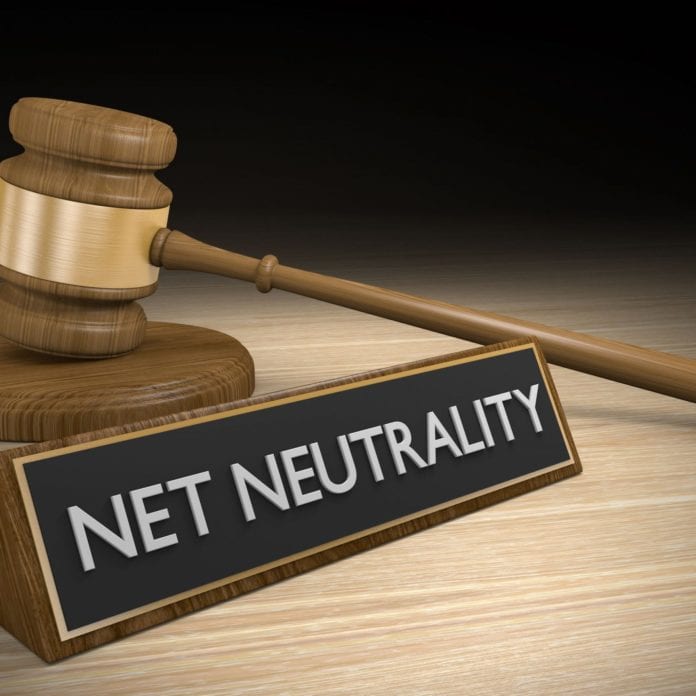Vote will take place on April 25
The Federal Communications Commission is set to vote—again—on net neutrality regulations.
The reinstatement of the Title II regulation of broadband internet access service is expected to pass, with Democrats in control of the fully-seated FCC. The vote will take place on April 25. If adopted, the rules would go into effect 60 days after being published in the Federal Register.
Net neutrality regulations, or the classification and regulation of broadband as a “telecommunications service” under the FCC’s Title II authority, were first introduced under the Obama administration and FCC Chairman Tom Wheeler in 2015. They were repealed in 2018 under the Trump administration and Chairman Ajit Pai.
In a release, the action was framed as something that will make sure the FCC has the authority to prevent providers from “blocking, slowing down, or creating pay-to-play internet fast lanes,” as well as providing oversight of broadband outages, giving the FCC additional tools to limit foreign-owned companies from providing broadband services, increasing consumer protections and providing a level national playing field rather than the state-level regulation that has come into play since the repeal of the original rules.
“The pandemic proved once and for all that broadband is essential,” said Chairwoman Jessica Rosenworcel. “After the prior administration abdicated authority over broadband services, the FCC has been handcuffed from acting to fully secure broadband networks, protect consumer data, and ensure the internet remains fast, open, and fair. A return to the FCC’s overwhelmingly popular and court-approved standard of net neutrality will allow the agency to serve once again as a strong consumer advocate of an open internet.”
Telecom industry groups responded with withering criticism of the anticipated action.
“So here we go again. It’s been two years since the White House asked Congress and the country to be all in on Internet for All. But just as this goal is now within reach, the FCC is pumping the brakes with this entirely counterproductive, unnecessary, and anti-consumer regulatory distraction,” said Jonathan Spalter, president and CEO of USTelecom.
Louis Peraertz, VP of policy for WISPA, said that the rules will be especially unsuited for “small providers who have no market power, nor any commercial interest to gain, from unreasonably interfering with or allowing nefarious actors to hack and trample upon their customers’ access to lawful Internet content. … Antiquated common carrier rules will inhibit investment and innovation in the very areas that need growth the most – hard to reach and serve rural, under-resourced and Tribal areas of America. In core sections of the new rules alone, there are several rules that mandate, instruct, limit and constrict what an ISP may, or may not, do when delivering broadband. WISPs have been able to serve their communities by virtue of what the government hasn’t done all these years – that is, not heavily regulate them like 1934 plain-old-telephone-service phone companies. Common carrier regulation of broadband ends that deregulatory approach and heaps exorbitant and hobbling compliance costs on small ISPs just to provide a single line of service.”
In particular, mobile operators are concerned about the potential regulatory impact on their ability to offer network-slicing-based services and for potential impacts on the broadband wholesale market; content distribution network (CDN) providers also are anxiously watching the proceedings. The concern about network slicing and whether the FCC would consider slicing-based services to be “pay to play Internet fast lanes” is increasingly relevant as network operators move to 5G Standalone and hope to further monetize their 5G network investments, and carriers want clarity from the FCC on just how network slices will be judged.
Verizon argued in a filing with the FCC that Title II classification of broadband internet
access service (BIAS) is “neither necessary nor lawful” and noted that some are calling for the FCC to expand the regulations to cover non-BIAS data services—which the original 2015 rules did not do. “These unprecedented, unlawful, and unsound proposals seek to threaten a promising technology—network slicing over wireless networks—even though advocates fail to identify any newfound threat or new regulatory gap to fill,” Verizon said.
The telco added: “Network slicing … will … help enable more efficient use of wireless networks, while also enabling capabilities and services that will support investment to deploy and add capacity to next-generation wireless networks. Placing unnecessary restrictions on this technology could stifle it in its infancy, to the detriment of consumers and our nation’s leadership position in the mobile economy.”
CTIA urged the FCC that “It should not go down the path of regulating and restricting technologies and smothering innovation before the potential benefits of new services and capabilities are even allowed to emerge.”
A public draft of the proposal will be available Thursday at fcc.gov.

